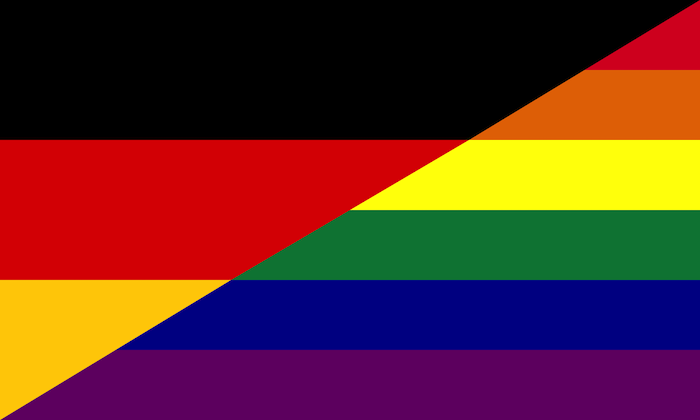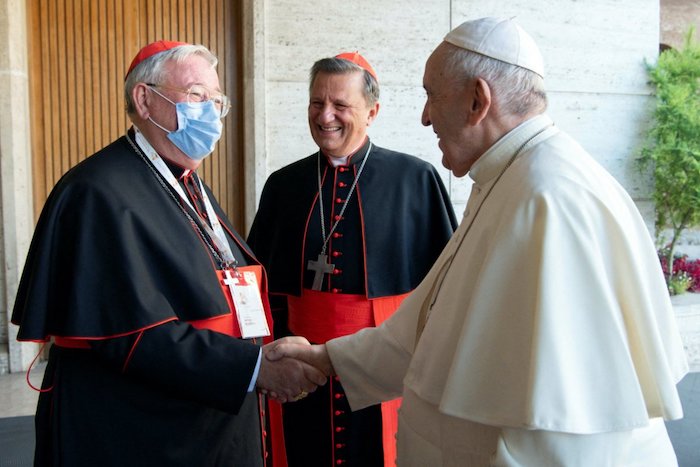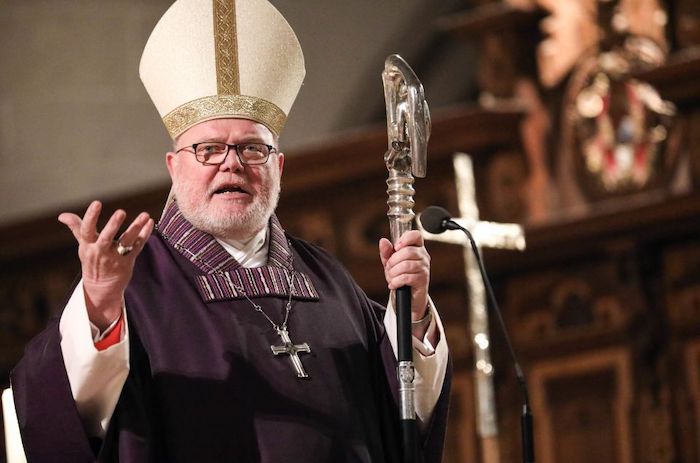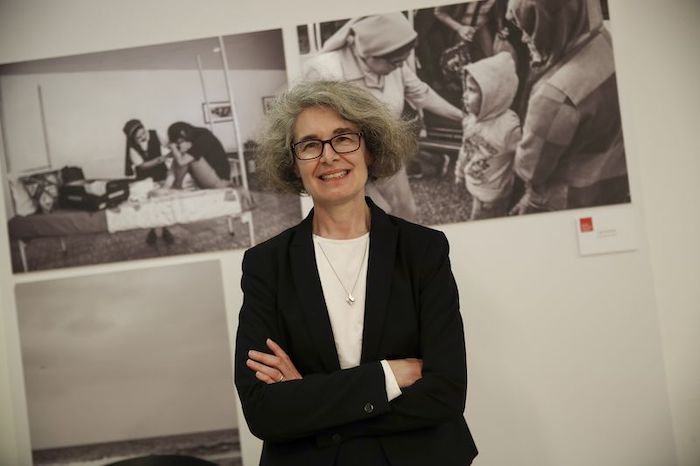A new collection of essays details the discrimination and exclusion experienced by queer people in the Catholic Church in Germany, adding to mounting pressure on the embattled institution to carry out reforms.

By Christoph Strack
Anyone who listens to folk and pop music in Germany will know Patrick Lindner. The 61-year-old has been in the music business for decades. He’s a well-known face on television and performs in German-speaking countries. Patrick Lindner is gay — and Catholic.
“In the fall of 2020, my husband and I got married,” Lindner writes in a book published earlier this week.
“It was important to us to also receive God’s blessing in church after the civil wedding. Contrary to his expectations, it was made possible without any problems.
A wish for the church
The artist talks about growing up in a Catholic environment, without having been “raised too strictly Catholic.” He describes his coming out in 1999 as a low point in his career, and the impact of fans’ outpouring support. He also writes about his mother’s wish: “I want you to be happy!” The same attitude, Lindner says, is what he would want from “Mother Church.”

Lindner’s contribution is one of 68 texts compiled and published by the priest Wolfgang Rothe in the German book “Wanted. Loved. Blessed. Being queer in the Catholic Church.” Not all of the authors belong to this group. Some essays are by relatives or friends. And, every fourth contribution is published anonymously, under the initials “N.N.”
Huge pressure on queer people
“Queer” is an umbrella term used to describe people whose sexual orientation or gender identity does not conform to heterosexual or cisgender ideas. Until now, the Catholic Church has rejected as dangerous any sexual orientation that diverts from heterosexuality.
Queer people who work for the Catholic Church — whether in parishes, kindergartens or retirement homes — can be fired at any time.
Wolfgang Rothe, who published the book, told DW that he wants the manuscript to depict the reality of queer people in the Catholic Church “as comprehensively as possible” and thus “bring about a change of perspective in our church.” Rothe said he himself “burst into tears” when he first read many of the contributions.
He said he hoped readers will feel the same way and understand just how much queer people in the church suffer from discrimination and exclusion. “This suffering must come to an end,” he said.

Rothe is among Catholic clerics in Germany who blessed same-sex couples at church in May 2021, even though the Vatican had previously banned such celebrations.
Hurt, fear and frustrations
“The divide is widening, the need for reform is obvious,” wrote architect Ulrike Fasching in the book. She lives in a so-called “rainbow family” — two women with one son.
Stefan Thurner, a geriatric nurse, when referring to his experiences in everyday community life, wrote: “To act as if there are no queer people is simply out of touch with reality.”
Three of the anonymous contributions come from the clergy. “I am a priest. And I’m gay,” is how one begins, expressing hurt that homosexuals, even if celibate, are not allowed to become priests at all under Vatican rules.

Film director and event manager Katrin Richthofer describes her tense relationship with the Catholic Church and comments on her lesbian daughter: “Don’t let a church ruin your faith! God created you just the way you are and loves you unconditionally!”
The collection is a catalog of hurts, fears and frustrations, as well as the hopes pinned on faith, and painful experiences surrounding the idea of home and identity.
Rothe explains why so many contributions are anonymous. “In this anonymity, the fear is expressed very clearly.” Among those who chose to publish anonymously, he says, are even some people “who are out of the closet in their everyday lives, but who were afraid to speak out in public.”
Need to accelerate reform
The book was published eight days after 125 queer church employees came out, causing a big stir in Germany. The timing was coincidental but it illustrates the growing calls for reform. As recently as last Sunday, the president of the German Bishops’ Conference, Bishop Georg Bätzing, had welcomed the coming out of numerous queer employees of his church. “We have deeply hurt people and continue to do so today,” he said on German public television network ARD.
But even Bätzing cannot guarantee that no church employee will be fired because of his or her sexual orientation. He refers to the ongoing reform of church labor law in Germany. That, however, has been going on for years — a fact Bätzing did not explicitly mention. The slow process has led to calls for lawmakers to raise pressure on the church.

The call for decisive action by bishops will become stronger again when the third plenary assembly of the “Synodal Way” of the Catholic Church in Germany meets in Frankfurt am Main at the end of the week.
The assembly, launched at the end of 2019, is intended to discuss — and advance — reforms.
Earlier in January, the publication of a new, damning report investigating historical sexual abuse at the Munich Archdiocese over several decades sparked renewed outrage. That has prompted many of the faithful to renew calls for swifter action, including recognizing queer people in the church.
Bishops go against the tide
One of those already taking action has his say in the book with the essay titled: “Encounters create change.” Bishop Heinrich Timmerevers, who is 69, describes his uncertainty before meeting with a group of queer Christians in Dresden.
“What they had to tell me touched me deeply,” Timmerevers writes. His diocese has now set up a counseling service for queer people. The Dresden bishop calls the Vatican’s refusal to bless same-sex partnerships “deeply devastating,” saying the church “cannot continue like this in the long run.”
Bishop Heinrich Timmerevers changed his stance on same-sex couples after meeting with Dresden’s queer community
Timmerevers is not alone. On March 13, Cardinal Reinhard Marx will celebrate a queer service in Munich’s Paulskirche. It also marks an anniversary. Since March 2002, queer people and their friends in the city have been celebrating “Roman Catholic services” once a month in Munich.
Marx’s presence will mark the first time that an archbishop will attend the anniversary — complete with champagne and a buffet.
Complete Article ↪HERE↩!
Luxembourg cardinal calls for revised Catholic teaching on gays; German archbishop backs loosening of celibacy rules

By PHILIP PULLELLA and ZUZANNA SZYMANSKA
A prominent liberal cardinal who leads a body representing European bishops has called for “fundamental revision” in Catholic teaching on homosexuality, and said it is wrong to fire Church workers for being gay.
The remarks by Luxembourg Cardinal Jean-Claude Hollerich to the German Catholic news agency KNA were among the most direct calls ever by a Roman Catholic leader for change in teaching on one of the most controversial issues in the church today.
Hollerich is president of the pan-European grouping of Catholic bishops’ conferences, known as COMECE.
In the KNA interview, Hollerich was asked for his assessment of a campaign in which about 125 Catholic Church employees in Germany, including some priests, came out as LGBTQ, and about the Church’s teachings on homosexuality.
“I believe that the sociological-scientific foundation of this teaching is no longer true,” he said in interview that was published on Tuesday in Germany.
In another part Hollerich said: “I think it’s time we make a fundamental revision of the doctrine”.
The Roman Catholic Church teaches that same-sex attraction is not a sin, but homosexual acts are.
Hollerich, who did not elaborate on what aspects of the teaching he felt needed revision, said: “I also believe that we are thinking ahead in terms of doctrine. The way the pope has expressed himself in the past can lead to a change in doctrine.”
Homosexuality is one of the most controversial issues in the 1.3 billion-member church, with conservatives accusing Pope Francis of giving mixed signals and confusing the faithful.
Francis has said that while the church cannot accept same-sex marriage, it can support civil union laws aimed at giving gay partners joint rights in areas of pensions, health care and inheritance.
He has sent notes of appreciation to priests and nuns who minister to gay Catholics and said parents of gay children should never condemn them, but under his watch the Vatican has also said priests cannot not bless same-sex couples.
In December, a Vatican department raised conservative ire when it apologised for “causing pain to the entire LGBTQ community” by removing from its website a link to resource material from a Catholic gay rights advocacy group in preparation for a Vatican meeting in 2023. It was later reposted.
In his interview with KNA, Hollerich also said gay church employees should not lose their jobs, something which has happened in some countries, particularly the United States.
“They know they have a home in the church. With us [the Luxembourg archdiocese] no-one is dismissed because they are homosexual,” he told KNA.
Complete Article ↪HERE↩!
German cardinal says priests should be allowed to marry
German Cardinal Reinhard Marx has called the Catholic Church practice of celibacy for priests “precarious,” and has said “sexuality is part of being human.”

The archbishop of Munich, Cardinal Reinhard Marx, has called for the Catholic Church to consider ending celibacy for priests, saying they should be allowed to marry if they wish.
“It would be better for everyone to create the possibility of having both celibate and married priests,” Marx said in comments to be published in Germany’s Süddeutsche Zeitung newspaper on Thursday.
“For some priests, it would be better if they were married. Not just for sexual reasons, but because it would be better for their lives and they wouldn’t be so lonely,” Marx told the paper.
“I think that things as they are cannot continue like this,” he said.
Sexual abuse scandal
His Archdiocese of Munich and Freising was the focus of a damning report in January that highlighted decades of sexual abuse by priests.
The report accused Pope Emeritus Benedict XVI, a former archbishop of Munich, of failing to take action against four suspected perpetrators. Marx himself was also accused of not taking action.
In 2021, Marx offered to resign over the church’s “institutional and systemic failure” in its handling of child sex abuse scandals. But Pope Francis rejected his offer, saying the cardinal should stay in his post and help push for reforms.
Celibacy, women priests up for discussion
Marx told the German newspaper that the practice of celibacy was “precarious,” but refused to draw a link between celibacy and cases of abuse that have shaken the Catholic Church around the world.
“This way of life and this grouping of men draws in people who are unsuited and who might not be mature,” he said. “But sexuality is part of being human.”
Marx was tight-lipped on the question of whether women should be priests, saying only that it was a topic that was being discussed inside the church.
“I’m not just a person who has an opinion,” he said. “I have to help hold the organization together.”
A new assembly aimed at reforming the German Catholic Church is set to begin in Frankfurt on Thursday. It is expected to address a number of topics, including the position of women in the church, Catholic sexual morality and celibacy.
Complete Article ↪HERE↩!
New Zealand’s Catholic church admits 14% of clergy have been accused of abuse since 1950
Figures represent first time abuse allegations against the church in New Zealand have been collated in one place

By Eva Corlett
New Zealand’s Catholic church has admitted that 14% of its diocesan clergy have been accused of abusing children and adults since 1950.
The church released the figures at the request of the royal commission on abuse in care, set up in 2018 by prime minister Jacinda Ardern, who said the country needed to confront “a dark chapter” in its history, and later expanded it to include churches and other faith-based institutions.
An interim report by the commission in December found up to a quarter of a million children, young people and vulnerable adults were physically and sexually abused in New Zealand’s faith-based and state care institutions from the 1960s to early 2000s.
Te Rōpū Tautoko, the group that coordinates church engagement with the royal commission, sought and examined records from the country’s six Catholic dioceses and from 43 Catholic religious congregations (also known as religious institutes, orders or associations). The research included records of 428 Catholic parishes, 370 Catholic schools and 67 other care institutions.
The allegations of abuse captured physical, sexual, and emotional or psychological abuse, and neglect. A failure to act on reports and facilitating abuse were also included.
The extent of the allegations of abuse in the church in Aotearoa New Zealand had not been collated before now, said Catherine Fyfe, the chair of Te Rōpū Tautoko.
“The Information Gathering Project was a major exercise involving dozens of people over two years, including searching paper files dating back 70 years in hundreds of places.”
The findings found that since 1950, 1,350 children and 164 adults reported suffering abuse, with the age of a further 167 not established by the research. Of the 1,680, almost half (835) were reports alleging sexual harm against a child and 80% of all reports were related to children. Of the total, 687 relate to educational facilities, 425 to residential care, 228 to parishes and 122 to other locations, and the rest were at unidentified locations.
Allegations were made against: 14% of Catholic diocesan clergy, who worked for a bishop and not a congregation, 8% of male congregational members (brothers or priests) and 3% of female congregation members (sisters or nuns). Most of the abuse reported happened in the 1960s and 1970s, with 75% occurring before 1990.
Te Rōpū Tautoko said that the records will not represent all abuse that has happened in the care of the Catholic church, as the research covers only recorded reports alleging abuse.
The Survivors Network of those Abused by Priests (Snap) said the actual scale of abuse was likely to be much higher based on the information it has from its members – “as high as twelvefold, given data indicating about only one in 12 have reported [abuse] in regions across New Zealand”.
“The church has simply released what information it has recorded and this should not be seen as a comprehensive listing of all abuse that has occurred. The actual scale of sexual abuse is very difficult to measure.”
Snap said while the church acknowledges that harm was done, there has been no substantial change in the church’s own internal training methods and culture. “In the handling of abuse complaints, its investigative processes are based on the balance of probabilities and are not complainant centred.”
The statistics were “horrifying” and something the church was “deeply ashamed of”, said Cardinal John Dew, the president of the NZ Catholic Bishops Conference.
“I am grateful that so much work has been done in researching the details and making them public.
“As we continue to respond to the royal commission into abuse and we build a safer church for everyone, I firmly hope that facts like these will help us to face the sad reality. The church will learn from this and affirm its commitment to the work of safeguarding.”
Complete Article ↪HERE↩!
Is Francis laying the foundation for women to become recognized priests?

Pope Francis has done more to reform the Roman Catholic church for a new age since Pope John XXIII convened the Second Vatican Council in the 1960s. The ferocity of opposition in U.S. Catholic conservative circles validates this assessment.
Francis acknowledged his growing opposition in off-hand remarks aboard the papal plane on Sept. 4, 2019. ABC News reported Francis as saying it is “an honor if the Americans attack me.”
But for all he is doing, he draws a line about the ordination of women.
He has accepted the decision of Pope John Paul II who said, “I declare that the Church has no authority whatsoever to confer priestly ordination on women and that the judgment is to be definitely held by all the church’s faithful.”
That did not silence women’s ordination advocates in 1994, and there are even more voices clamoring for it today.
This may have paid off since the Vatican recently included a group lobbying for women’s ordination – the Women’s Ordination Conference — on a website promoting the two-year synod concluding in 2023. In other words, Francis wants to hear from them as well as many other Catholic advocacy groups.
And there’s the rub: Women’s ordination may be way off in the future. But some commentators believe that Francis’ small, incremental moves, like the WOC inclusion and regularizing the roles of lector and eucharistic minister for women, can make it easier for his successor to eventually ordain women though Francis has never acknowledged this objective.
Kate McElwee, executive director of the WOC, admitted to America Magazine that she was surprised the Vatican had accepted the group’s inclusion on the “Resources” site and said it showed “a lot of courage” from the synod office.
What took real courage, however, was the ordination of seven women as priests in the Catholic church by three bishops on a cruise ship on the Danube in 2007. That gave birth to a movement, mostly in North America, that has ordained about 200 women as priests to date. Still, it’s a drop in the bucket compared to the number of male priests totaling about 410,000 worldwide.
Other Christian denominations and Reform Judaism, meanwhile, have ordained women for decades.
The Vatican declared the 2007 and subsequent ordinations illicit and said the women declared themselves excommunicated by undergoing the ordination. But the church has stopped making such statements.
Validly ordained male bishops ordained the women to assure apostolic succession and while they are valid, the Vatican will not accept them.
Take the case of Ludmila Jararova, who was secretly ordained a priest in Communist Czechoslovakia back in 1970 for the underground church. Once the church could practice publicly, her male underground peers could continue as priests but she could not.
Author Jill Peterfeso has done an excellent job getting behind the movements that have fostered women for ordinations, the women priests themselves and the communities they lead outside the normal parish structure. In “Womenpriest,” published by Fordham University, one of her major conclusions is that these women do no want to simply be ordained like males.
Their credo, she writes, could be: “We have not walked away from Rome. We offer a new model of ordained ministry in a renewed Roman Catholic Church.”
These “womenpriests,” a word coined by the advocacy groups, resist the clericalism that has kept a patriarchal system in place and want more inclusion all across the board. And on the heels of major clerical sexual abuse scandals, which are still reverberating throughout the world, Peterfeso wrote: “If male priests’ bodies inspire fear and distrust, womenpriests’ bodies represent new potential.”
Without major reform, women are voting with their feet, concluded Peterfeso.
“While women’s attendance at Mass is higher than men, women’s declined twice as much as men,” she wrote.
And the decline among millennial women is significant.
“Nones” — those claiming no religion — are growing. Another group, A Church for our Daughters — an online program supported by about two dozen women’s equality groups — knows that justice and equality for women is still a potent movement and without inclusion of women in church leadership, young women will continue to walk away.
Pope Francis has appointed women to positions of greater authority than any previous pontiff. In 2019, 24 percent of employees at the Holy See were women, compared with 17.6 percent in 2010. When Sister Nathalie Becquart, a member of the Congregation of Xavières, was appointed the first woman undersecretary of the Synod of Bishops, she told reporters her appointment was evidence that “the patriarchal mindset [of the church] is changing.” Cardinal Tobin in Newark, who serves on the Vatican Synod Committee, has praised her accomplishments.
Charles Carr, my seminary classmate now in Philadelphia who left before ordination, said, “My personal vote would be for ordaining women as priests. If Eucharist, or union with Christ, is foundational for Christians to experience rebirth into a new life, then why would we not imagine the power of women to play this transformative sacramental role?”
And while most polls show Catholic overwhelmingly support ordaining women, Peterfeso reveals that more would prefer the institutional church ratify the change. As I approach 40 years as a priest, I have met many women who can lead.
Complete Article ↪HERE↩!

